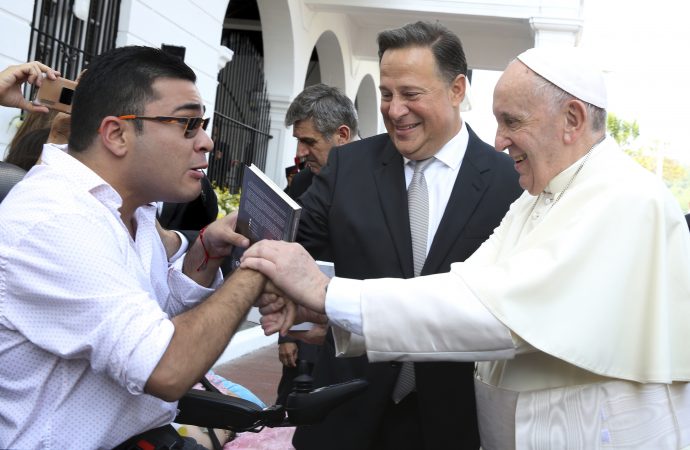Closing a frenetic first day in Panama at a global Catholic festival that brings together youth from every race, culture and language, Pope Francis said that while the Devil tries to sow division, the faith fuels a spirit of unity.
“You have that instinct which knows intuitively that, ‘True love does not eliminate legitimate differences, but harmonizes them in a superior unity,’” Francis said, quoting Pope emeritus Benedict XVI.
“On the other hand, we know that the father of lies prefers people who are divided and quarreling to people who have learned to work together,” he said.
Francis then referred to the likelihood that Benedict was following the goings-on in Panama.
“You know who said this? Pope Benedict, who’s watching us from TV. We send him our greetings, all together, clapping, to Pope Benedict,” he said, to cheers from the young crowd.
The hundreds of thousands who gathered on Thursday for the official opening of World Youth Day, a Vatican-sponsored gathering, come from 155 countries, according to official registration information, which also reports over 180,000 people signed up for the event.
“We are different in so many ways! But none of it has stopped us from meeting one another and rejoicing to be together,” Francis said. “The reason for this, we know, is that something unites us. Someone is a brother to us.”
“You, dear friends, have made many sacrifices to be able to meet one another and, in this way, you have become true teachers and builders of the culture of encounter,” the pope said.
Because of the way young people look at things and due to their sensitivities, the pontiff said, they discredit “the kind of talk that is intent on sowing division, on excluding or rejecting those who are not ‘like us’.”
The youth gathered in Panama, the pope said, teaches older generations that encountering one another doesn’t mean to wear the same things, listening to the same music or believing the same things. No, he said, the culture of encounter is a call to “dare to keep alive a shared dream … A great dream, a dream that has a place for everyone. The dream for which Jesus gave his life on the cross.”
Though the spirit in the streets of Panama City, particularly in the coastal area where all the major events are taking place this week, is visibly one of celebration, this does not mean that the participants are immune to the tragedies many are facing in their home countries.
On Thursday afternoon, Crux spoke with a group of pilgrims who are originally from Venezuela, but all of them today live “in diaspora,” having fled the regime of Nicolas Maduro. They watched the events that unfolded the previous day, with the president of the National Assembly constitutionally taking over the presidency, after a day of protests that left 26 people dead.
“We all fled Caracas in the past three years,” one of them called Yoani told Crux. “We went to school together, shared our parish life, but had to leave to find a future. It’s a dream that’s come true that we were able to gather here, when some of us live in the United States, some in Argentina, Brazil, Chile, and one even in the United Kingdom.”
A group of pilgrims from Nicaragua, currently on the verge of a crisis not too different from the one Venezuela is living, had a similar view, though some are still in their families’ homes, so they were even less forthcoming with names.
Eight of Nicaragua’s 10 bishops are currently in Panama, taking part in World Youth Day, and there are some 2,700 pilgrims from the Central American nation. However, before last April, when the civil uprising against President Daniel Ortega began, from the diocese of Granada alone, some 10,000 had expressed an interest in attending.
But beyond Central America, pilgrims come from all over: Almost 7,500 from the United States, the second-largest country in terms of registered pilgrims after Panama; over 1,600 from Francis’s native Argentina; at least one pilgrim from virtually every African country; and 135 pilgrims from the United Arab Emirates, which Francis will visit a week after his return to Rome.
When faced with the question of “What keeps us united?” Francis said, Christians can say it’s the “certainty of knowing that we have been loved with a profound love that we neither can nor want to keep quiet, [and] challenges us to respond in the same way: with love. It’s the love of Christ that urges us on.”
Quoting El Salvador’s martyred Archbishop Oscar Romero, the pontiff said that “Christianity is not a collection of truths to be believed, of rules to be followed, or of prohibitions. Seen that way it puts us off. Christianity is a person who loved me immensely, who demands and asks for my love. Christianity is Christ.”
Christ’s love, he continued, is one that is neither overwhelming nor oppressive, that humiliates or tries to dominate.
“It’s the love of the Lord, a daily, discreet and respectful love; a love that is free and freeing, a love that heals and raises up,” the pope said. “The love of the Lord has to do more with raising up than knocking down, with reconciling than forbidding, with offering new changes than condemning, with the future than the past. It is the quiet love of a hand outstretched to serve, a commitment that draws no attention to itself.”
Before the pope’s remarks, four young men and women from El Salvador, Mexico, Haiti and Peru introduced the patron saints of WYD, including St. John Paul II and Romero.
Francis is scheduled to remain in Panama until Sunday, when he will head back to Rome on a 13-hour flight. Before then, he will deliver seven more sets of prepared remarks, one of them at a youth detention center, and say Mass on Sunday, with a crowd that might reach over a quarter of a million people.

